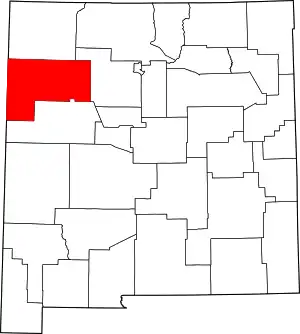Gallup
| |
|---|---|
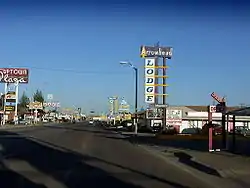 Motels and businesses in Gallup | |
 Flag | |
| Nickname: "Indian Capital of the World" | |
 Location of Gallup in New Mexico | |
 Gallup Location in the United States | |
| Coordinates: 35°31′41″N 108°44′33″W / 35.52806°N 108.74250°W | |
| Country | United States |
| State | New Mexico |
| County | McKinley |
| Founded | 1881 |
| Government | |
| • Mayor | Louis Bonaguidi |
| Area | |
| • City | 20.19 sq mi (52.30 km2) |
| • Land | 20.19 sq mi (52.29 km2) |
| • Water | 0.00 sq mi (0.01 km2) |
| Elevation | 6,647 ft (2,026 m) |
| Population | |
| • City | 21,899 |
| • Density | 1,084.65/sq mi (418.78/km2) |
| • Metro | 71,492 |
| Time zone | UTC−7 (MST) |
| • Summer (DST) | UTC−6 (MDT) |
| ZIP codes | 87301-87305 |
| Area code | 505 |
| FIPS code | 35-28460 |
| GNIS feature ID | 2410562[3] |
| Website | www.gallupnm.gov |
Gallup (/ˈɡæ.ləp/ Navajo: Naʼnízhoozhí) /nɑ̀ʔnɪ́ʒòːʒɪ́/; Zuni: Kalabwaki) is a city in McKinley County, New Mexico, United States, with a population of 21,899 as of the 2020 census.[4] A substantial percentage of its population is Native American, with residents from the Navajo, Hopi, and Zuni tribes. Gallup is the county seat of McKinley County[5] and the most populous city between Flagstaff and Albuquerque, along historic U.S. Route 66.
The city was founded in 1881 as a railhead for the Atlantic and Pacific Railroad, and named after David Gallup, a paymaster for the railroad.[6] It is on the Trails of the Ancients Byway, one of the designated New Mexico Scenic Byways.[7] Because of the nearby rugged terrain, it was a popular location in the 1940s and 1950s for Hollywood Westerns.[8]
History
Gallup was founded in 1881 as a railhead for the Atlantic and Pacific Railroad. The city was named after David Gallup, a paymaster for the Atlantic and Pacific Railroad. There is widespread belief that during World War II, the city fought successfully to prevent 800 Japanese American residents from being placed in wartime internment, the only New Mexico city to do so.[9][10] But this is not true. Executive Order 9066 was never used to intern people living in Gallup, and the city complied with all federal orders and policies during the war.[11]
Gallup is known as the "Heart of Indian Country" because it is on the edge of the Navajo reservation and is home to members of many other tribes, as well.[12]
The City of Gallup and McKinley County are part of the ancestral, cultural and present day homeland of the Navajo (Diné) & the Zuni (A:shiwi). [13]
Culture
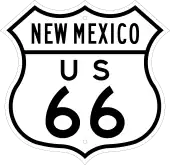
U.S. Route 66 passed through Gallup, and the town's name is mentioned in the lyrics of the song "(Get Your Kicks on) Route 66" ("You'll see Amarillo and Gallup, New Mexico"). In 2003, the U.S. and New Mexico Departments of Transportation renumbered US Highway 666, the city's other major highway, as Route 491. Former Governor Bill Richardson pushed for (and got) the number changed because "666" is associated with Satan and Devil worship, thus it was considered "cursed" or a "Beast" to some locals. The situation was exacerbated by the high death toll on the highway, which was largely a result of high rates of drivers under the influence of alcohol or drugs, and budget shortfalls among both the New Mexico Department of Transportation and state and local law-enforcement agencies.[14]
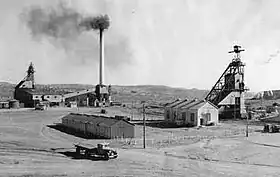
Gallup has a modestly lively night time culture downtown, Indian dances during summertime nights, art crawls, and small museums, including a Navajo code talk museum.[15] Gallup commissioned a number of murals highlighting local culture, and contributions dot downtown.[16][17]
Being the largest city between Flagstaff and Albuquerque, Gallup claims many notable buildings, places, events, and people.[18] The historic El Rancho Hotel & Motel has hosted a numerous array of movie stars, including John Wayne, Ronald Reagan, Humphrey Bogart, Spencer Tracy, Katharine Hepburn, Joan Crawford, Kirk Douglas, Doris Day, Gregory Peck, and Burt Lancaster. The rugged terrain surrounding Gallup was popular with Hollywood filmmakers during the 1940s and '50s for the on-location shooting of Westerns. Actors and film crews would stay at that hotel during filming. Films made in Gallup include Billy the Kid (1930), Pursued (1947), The Sea of Grass (1947), Four Faces West (1948), Only the Valiant (1951), Ace in the Hole (1951), Escape from Fort Bravo (1953), A Distant Trumpet (1964), and The Hallelujah Trail (1965). Other movies shot here are Redskin (1928), and Superman (1978).[19]
Gallup is sometimes called the "Indian Capital of the World", for its location in the heart of Native American lands, and the presence of Navajo, Zuni, Hopi, and other tribes. Well over a third of the city's population has Native American roots. Gallup's nickname references the huge impact of the Native American cultures found in and around the city.
In 2013, Gallup was named by Rand McNally as the "Most Patriotic Small Town in America 2013".[20]
Geography
Gallup is located at 35°31′41″N 108°44′33″W / 35.52806°N 108.74250°W (35.5280783, −108.7425843).[3] According to the United States Census Bureau, the city has a total area of 13.4 square miles (35 km2), all land.
Demographics
| Census | Pop. | Note | %± |
|---|---|---|---|
| 1900 | 2,948 | — | |
| 1910 | 2,264 | −23.2% | |
| 1920 | 3,920 | 73.1% | |
| 1930 | 5,992 | 52.9% | |
| 1940 | 7,041 | 17.5% | |
| 1950 | 9,133 | 29.7% | |
| 1960 | 14,089 | 54.3% | |
| 1970 | 14,596 | 3.6% | |
| 1980 | 18,167 | 24.5% | |
| 1990 | 19,154 | 5.4% | |
| 2000 | 20,209 | 5.5% | |
| 2010 | 21,678 | 7.3% | |
| 2020 | 21,605 | −0.3% | |
| U.S. Decennial Census[21][2] | |||
As of the 2000 census, 20,209 people, 6,810 households, and 4,869 families were residing in the city. The population density was 1,513.7 inhabitants per square mile (584.4/km2). There were 7,349 housing units at an average density of 550.5 per square mile (212.5/km2). The racial makeup of the city was 43.8% Native American, 35.2% White, 2.0% Asian, 1.2% African American, 12.1% from other races, and 5.8% from two or more races. About 31.7% of the population was Hispanic or Latino of any race.[22]
Of the 6,810 households, 41.1% had children under 18 living with them, 45.3% were married couples living together, 19.8% had a female householder with no husband present, and 28.5% were not families. About 23.8% of all households were made up of individuals, and 6.8% had someone living alone who was 65 or older. The average household size was 2.85, and the average family size was 3.39.
In the city, the age distribution was 32.7% under 18, 9.3% from 18 to 24, 28.8% from 25 to 44, 20.3% from 45 to 64, and 8.9% who were 65 or older. The median age was 31 years. For every 100 females, there were 91.0 males. For every 100 females 18 and over, there were 86.2 males.
It has close proximity to Native American reservations, and historic lack of economic development in addition to many mine closures in the last century. As a result of these closures, a large proportion of Gallup's households is low-income. The median income for a household in the city was $34,868, and the median income for a family was $39,197. Males had a median income of $33,380 versus $24,441 for females. The per capita income for the city was $15,789. About 16.6% of families and 20.8% of the population were below the poverty line, including 26.8% of those under age 18 and 16.8% of those age 65 or over.
Crime
Crime is a serious problem in Gallup. In 2012, violent crime was nearly five times the national average.[23] As a result, the city has the highest violent crime rate in New Mexico. According to an article published in November 2014, "Gallup saw 463 violent crimes last year including murder, rape, robbery, and aggravated assault. That’s an 11% increase from the year before and two times the rate of Albuquerque, the state’s largest city."[24]
Parade ramming
On August 4, 2022, an SUV, driven by an intoxicated individual, drove through a parade crowd during the city's 100th annual Intertribal Celebration, leaving 15 injured, including two police officers and several children.[25][26]
Education
Gallup-McKinley County Public Schools is the local school district.
Previously, the Bureau of Indian Affairs (BIA) operated Manuelito Hall in Gallup, a dormitory that housed Native American students attending Gallup-McKinley schools. In 1973, it had about 300 students. That year, the BIA closed Manuelito Hall, planning to move students to various boarding schools.[27]
Transportation
Airport
- Gallup Municipal Airport is a public airport with primarily private and charter flights. The Aviation Identifier for the airport is GUP.
Major highways
Railroad
- Rail freight service passes through Gallup on the Southern Transcon of the BNSF Railroad.
- Amtrak's Southwest Chief provides passenger service at the Gallup train station.
Bus
- The Navajo Transit System provides regional bus services throughout the Navajo Nation. Gallup is served by Route 05 to Fort Defiance, Arizona, and Route 06 to Crystal, New Mexico.[28]
- The Gallup Express provides local service to Gallup and connection to Zuni.
- A:shiwi Transit connects Zuni Pueblo and Black Rock with Gallup.
- Greyhound has a local stop on West Highway 66.
Climate
Gallup, like most of the interior Mountain West, has a cool semiarid climate (Köppen BSk). The summers are hot during the day, but the high altitude and low humidity mean that nights remain distinctly cool; as late as July 2, 1997, the temperature fell to 31 °F (−1 °C). Despite the large diurnal temperature range, most rain falls in the summer from afternoon thunderstorms. Snow is common and sometimes heavy; the maximum in a month is 29.1 inches (73.91 cm) in December 1992 and the most in a year 65.1 inches (165.35 cm) between July 1990 and June 1991. Actual snow cover, with the hot sun at Gallup's altitude, however, has never exceeded 13.1 inches (33 cm), and for no day averages over 3.5 inches (8.9 cm).
| Climate data for Gallup Municipal Airport, New Mexico, 1991–2020 normals, extremes 1973–present | |||||||||||||
|---|---|---|---|---|---|---|---|---|---|---|---|---|---|
| Month | Jan | Feb | Mar | Apr | May | Jun | Jul | Aug | Sep | Oct | Nov | Dec | Year |
| Record high °F (°C) | 68 (20) |
73 (23) |
80 (27) |
86 (30) |
95 (35) |
101 (38) |
101 (38) |
98 (37) |
96 (36) |
87 (31) |
78 (26) |
66 (19) |
101 (38) |
| Mean maximum °F (°C) | 57.5 (14.2) |
63.5 (17.5) |
71.8 (22.1) |
78.8 (26.0) |
87.1 (30.6) |
94.9 (34.9) |
96.2 (35.7) |
93.1 (33.9) |
88.8 (31.6) |
80.7 (27.1) |
69.7 (20.9) |
59.5 (15.3) |
97.1 (36.2) |
| Mean daily maximum °F (°C) | 45.4 (7.4) |
49.9 (9.9) |
58.5 (14.7) |
65.7 (18.7) |
75.0 (23.9) |
86.2 (30.1) |
88.8 (31.6) |
86.1 (30.1) |
79.9 (26.6) |
68.5 (20.3) |
55.8 (13.2) |
45.2 (7.3) |
67.1 (19.5) |
| Daily mean °F (°C) | 29.8 (−1.2) |
34.4 (1.3) |
40.6 (4.8) |
47.0 (8.3) |
55.6 (13.1) |
65.7 (18.7) |
71.7 (22.1) |
69.7 (20.9) |
62.2 (16.8) |
49.7 (9.8) |
38.0 (3.3) |
29.5 (−1.4) |
49.5 (9.7) |
| Mean daily minimum °F (°C) | 14.2 (−9.9) |
18.9 (−7.3) |
22.7 (−5.2) |
28.3 (−2.1) |
36.3 (2.4) |
45.1 (7.3) |
54.5 (12.5) |
53.3 (11.8) |
44.4 (6.9) |
31.0 (−0.6) |
20.2 (−6.6) |
13.9 (−10.1) |
31.9 (−0.1) |
| Mean minimum °F (°C) | −3.7 (−19.8) |
1.6 (−16.9) |
7.6 (−13.6) |
13.7 (−10.2) |
23.0 (−5.0) |
32.3 (0.2) |
43.3 (6.3) |
42.9 (6.1) |
28.9 (−1.7) |
15.5 (−9.2) |
4.1 (−15.5) |
−4.9 (−20.5) |
−8.4 (−22.4) |
| Record low °F (°C) | −20 (−29) |
−25 (−32) |
−10 (−23) |
6 (−14) |
12 (−11) |
23 (−5) |
31 (−1) |
35 (2) |
20 (−7) |
1 (−17) |
−26 (−32) |
−34 (−37) |
−34 (−37) |
| Average precipitation inches (mm) | 0.81 (21) |
0.71 (18) |
0.62 (16) |
0.46 (12) |
0.57 (14) |
0.36 (9.1) |
1.63 (41) |
1.92 (49) |
1.27 (32) |
0.92 (23) |
0.70 (18) |
0.73 (19) |
10.70 (272) |
| Average snowfall inches (cm) | 6.3 (16) |
5.9 (15) |
4.4 (11) |
2.3 (5.8) |
1.1 (2.8) |
0.0 (0.0) |
0.0 (0.0) |
0.0 (0.0) |
0.0 (0.0) |
1.5 (3.8) |
4.5 (11) |
7.8 (20) |
33.8 (86) |
| Average precipitation days (≥ 0.01 inch) | 6.1 | 6.0 | 5.4 | 4.2 | 4.2 | 2.8 | 10.2 | 10.7 | 7.0 | 5.5 | 4.6 | 5.8 | 72.5 |
| Average snowy days (≥ 0.1 inch) | 4.3 | 4.5 | 2.5 | 2.6 | 0.7 | 0.0 | 0.0 | 0.0 | 0.0 | 0.9 | 2.5 | 4.5 | 22.5 |
| Source: NOAA[29][30] | |||||||||||||
Notable people
- Tony Genaro, late actor
- Anthonette Cayedito, kidnap victim, missing child
- Glenn L. Emmons, former Gallup banker (1929) and the commissioner of the BIA (1953–1961)[31]
- Mike Everitt, former Major League Baseball umpire
- Sydney Freeland, filmmaker
- Chon Gallegos, former NFL quarterback for the Oakland Raiders
- Carl Nelson Gorman (Kin-Ya-Onny-Beyeh), Navajo code talker during World War II, visual artist, painter, illustrator, and professor; lived in Gallup from 1973 until 1998.[32]
- Arthur T. Hannett, mayor of Gallup, and seventh governor of New Mexico
- Vernon Kerr, scientist and member of the New Mexico House of Representatives
- Lealand McSpadden, racing driver
- Hiroshi H. Miyamura, Medal of Honor recipient in the U.S. Army, awarded for his actions during the Korean War
- Eric-Paul Riege, Contemporary artist
- Carolyn S. Shoemaker, astronomer and co-discoverer of Comet Shoemaker-Levy 9
- Sunshine Sykes, lawyer and jurist
Gallery
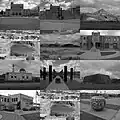 Sights of Gallup
Sights of Gallup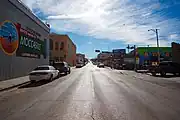 South 3rd Street
South 3rd Street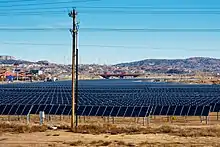 Solar farm in Gallup
Solar farm in Gallup
See also
- Roman Catholic Diocese of Gallup
- USS Gallup, name of three ships in the United States Navy, the later two named for the city of Gallup
References
- ↑ "ArcGIS REST Services Directory". United States Census Bureau. Retrieved October 12, 2022.
- 1 2 "Census Population API". United States Census Bureau. Retrieved October 12, 2022.
- 1 2 "Gallup". Geographic Names Information System. United States Geological Survey, United States Department of the Interior.
- ↑ "U.S. Census Bureau QuickFacts: Gallup city, New Mexico". www.census.gov. Retrieved June 15, 2022.
- ↑ "Find a County". National Association of Counties. Archived from the original on May 31, 2011. Retrieved June 7, 2011.
- ↑ "History of Greater Gallup New Mexico". Greater Gallup Economic Development Corporation. Retrieved November 15, 2020.
- ↑ Trail of the Ancients. Archived August 21, 2014, at the Wayback Machine New Mexico Tourism Department. Retrieved August 14, 2014.
- ↑ Evans, Andrew (May 9, 2014). "Route 66: Gallup". National Geographic. Archived from the original on July 18, 2020.
The El Rancho Hotel and Motel was a popular place for Hollywood stars to stay while filming Western movies near Gallup, New Mexico.
- ↑ "curriculum, "Enduring Communities, "page 60, day 9, "the Gallup Experience"" (PDF). Japanese American National Museum, 369 East First Street, Los Angeles, CA 90012. Retrieved September 25, 2016.
- ↑ "Gallup bucked the system". Route 66 News. May 9, 2014. Archived from the original on May 12, 2014. Retrieved September 25, 2016.
- ↑ Mingus, Matthew D. (2021). "The Myth of Resistance: Gallup, New Mexico, and Japanese American Internment". New Mexico Historical Review. 96 (4): 405–419.
- ↑ "Plaques to be guide to city's past". Gallup Independent. Archived from the original on May 7, 2006. Retrieved July 24, 2008.
- ↑ "GALLUP, NM HOUSING IMPACT ASSESMENT". MckinleyHealthAlliance.org - Community Health Data. McKinley Community Health Alliance. p. 5. Retrieved March 24, 2023.
- ↑ "U.S. 666: "Beast of a Highway"?". Highway History. United States Department of Transportation – Federal Highway Administration. Retrieved September 12, 2013.
- ↑ "Downtown Gallup". Gallup Chamber of Commerce. Gallup Chamber of Commerce, Gallup NM. Retrieved September 25, 2016.
- ↑ "Downtown Gallup". Gallup Chamber of Commerce. Gallup Chamber of Commerce, Gallup NM. December 24, 2014. Retrieved September 25, 2016.
- ↑ "Navajo Code Talkers Mural". Be Sargent. Be Sargent, artist. Retrieved September 25, 2016.
- ↑ "Photos Cities Gallup". gallup.ipub.us. ipub.us, Actual news in your location. Retrieved September 25, 2016.
- ↑ Barth, Jack (1991). Roadside Hollywood: The Movie Lover's State-By-State Guide to Film Locations, Celebrity Hangouts, Celluloid Tourist Attractions, and More. Contemporary Books. Page 55. ISBN 9780809243266.
- ↑ "Presenting the 2013 Winners". Rand McNally. Archived from the original on October 24, 2013. Retrieved November 22, 2013.
- ↑ "Census of Population and Housing". Census.gov. Retrieved June 4, 2015.
- ↑ "U.S. Census website". United States Census Bureau. Retrieved January 31, 2008.
- ↑ "Crime in Gallup, New Mexico (NM): murders, rapes, robberies, assaults, burglaries, thefts, auto thefts, arson, law enforcement employees, police officers, crime map". City-data.com. Retrieved October 14, 2017.
- ↑ "Report: Gallup has highest violent crime rate in NM". Krqe.com. November 11, 2014. Archived from the original on December 7, 2014. Retrieved October 14, 2017.
- ↑ "SUV drives into Gallup Intertribal Ceremonial parade, causing injuries". Navajo-Hopi Observer. Retrieved August 6, 2022.
- ↑ "SUV plows through parade route in New Mexico injuring 15 people including two police officers". USA Today. Retrieved August 6, 2022.
- ↑ "BIA Closes Manuelito Hall". Gallup, New Mexico: The Gallup Independent. April 14, 1973. pp. 1, 6. - Clipping of first and of second page at Newspapers.com.
- ↑ "Transportation | Gallup, NM - Official Website". www.gallupnm.gov. Retrieved November 8, 2020.
- ↑ "NOWData – NOAA Online Weather Data". National Oceanic and Atmospheric Administration. Retrieved September 8, 2022.
- ↑ "Summary of Monthly Normals 1991–2020". National Oceanic and Atmospheric Administration. Retrieved September 8, 2022.
- ↑ New York Times. "Indian Director Sworn In: Glenn L. Emmons Takes Office Succeeding Dillon S. Myer." August 11, 1953.
- ↑ Thomas, Robert Jr. (February 1, 1998). "Carl Gorman, Code Talker In World War II, Dies at 90". The New York Times. ISSN 0362-4331. Retrieved September 15, 2021.
External links
- Official city website
 Gallup travel guide from Wikivoyage
Gallup travel guide from Wikivoyage
